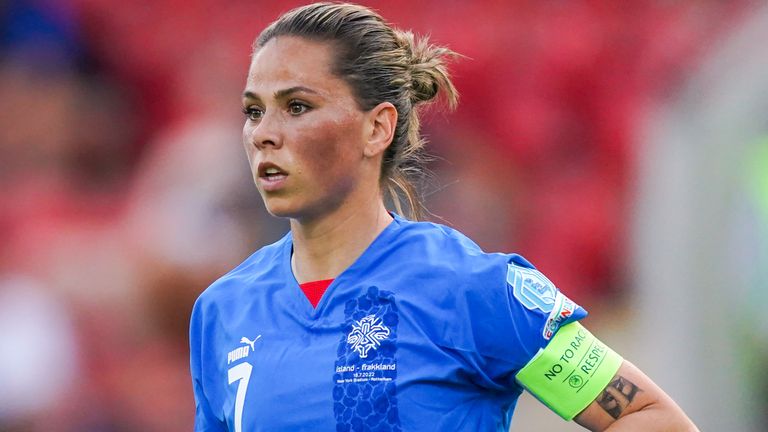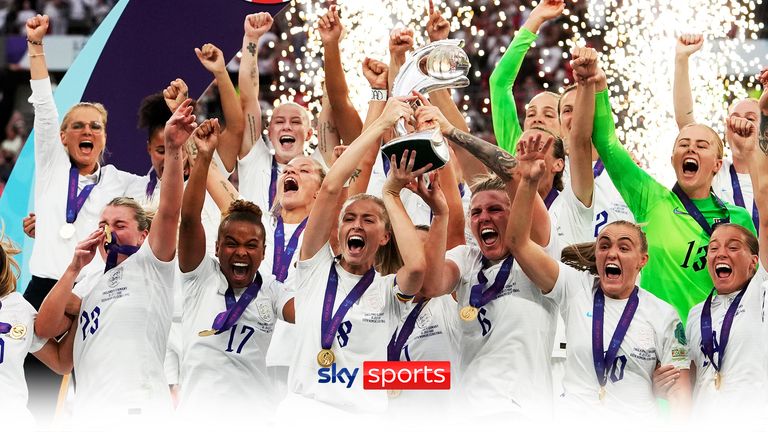Future of Football: How rise of player power is shaping future of women's game
"The strength of the women's football community is a phenomenon and they are the ones who are driving the game forward": fighting inequalities, commercial growth and empowering the next generation of talent; the players can hold the cards when it comes to the future of the women's game

Wednesday 26 July 2023 22:13, UK
From the Lionesses putting pressure on the Government for girls' rights to play football or discussions with the FA over bonus talks, to the new mums calling out clubs for substandard maternity rights - players have been using their voice over the last 12 months.
What is clear, is they will not stop in taking a stand against inequalities in the future. In fact the growth of players fighting for the greater good is being supported and positively encouraged as leading brands align their own empowering messages with the emboldened stars.
Only last year Leah Williamson added to her growing portfolio of sponsorship deals - which includes Pepsi and Nike - by signing a lucrative deal with Gucci to strengthen their 'Chime For Change' global campaign. More recently, the England captain, who has been forced to sit out this year's World Cup with an ACL injury, became a stakeholder in Toca Football, which runs football-themed social entertainment venues in her effort to normalise the participation of women and girls in the game.
Alessia Russo, who shot to prominence during the Euros last summer and dominated the headlines in the final stages of the January transfer window before her summer switch to Arsenal, is reported to have earned an estimated £4,000 per sponsored post in the first quarter of 2023 through her deals with Oakley and Adidas. The forward is expected to have doubled that figure in the lead up to the World Cup. According to Betting.com, only Williamson, Lucy Bronze and Beth Mead have earned more from social media sponsored posts so far this year.
Deloitte's Annual Review of Football Finance last month showed WSL clubs in the 2021/22 season - which preceded England's Euros-winning summer - brought in a combined revenue of £32m and their Sports Business Group director Zoe Burton believes clubs will look to the commercial growth of players in the future as they continue to build income and expand fanbase.
Trending
- Neville backs Amorim's call to drop Rashford and Garnacho
- Pep says 'I'm not good enough' as Man City crisis deepens
- Derby day DRAMA! Amad steals show to pile pressure on Pep's City
- Southampton sack Martin after Spurs hammering
- 'No more!' | Neville backs Amorim move to drop Garnacho and Rashford
- Hojlund's love letter to Walker after Manchester derby clash
- Transfer Centre LIVE! Will Man Utd sell Rashford next month?
- Onana sees off Foden strike to deny City second
- Chelsea hold on to beat Brentford - rate the players LIVE!
- Whyte breaks down Tetteh in brutal slugfest
"The stage which women's football is at at the moment is about broadening out the funnel, getting as many people to watch and attend games." Burton told Sky Sports.
"Then the focus is, how do you keep them in the funnel? How do you keep them engaged throughout the season and then on to the next season? So that initial exposure and retention of fan is where a lot of focus will be for clubs.
"We are seeing that women's football fans are fans of the game and of the league rather than necessarily having a deep club affiliation yet, so I think that's something that will continue to change and evolve over the next three years. But that really has to be a focus in terms of how do you retain that fandom?
"Then I think the other piece, which is potentially different from the men's game, there's been a real focus on how do you commercialise the women's game? The commercial revenue, whether that's from sponsorships, or more innovative partnerships, will be a big focus for clubs and women's football going forwards and that's what we've seen out of the English game, so the focus has shifted to commercial revenue rather than necessarily broadcast revenue and that's something we think the English game will follow.
"The stories which the athletes can tell can be really powerful to bring on those fans, but also bring in the commercial sponsors as well and really open up a whole new world of different types of sponsors that haven't necessarily been interested in men's football before, that maybe are interested in women's football," Burton added.
The 'Alex Morgan' effect shows the way
Last month, National Women's Soccer League side Gotham's marketing team tapped into an opponent's pulling power to break their home attendance record.
"See Alex Morgan at Red Bull Arena", was the message splashed on Gotham's social media channels in the build-up to their league contest against San Diego Wave featuring their USWNT star.
The result? A record-breaking crowd in excess of 15,000 turned out to watch a player boasting 10m followers on Instagram and a two-time World Cup winner.
"I know the Alex Morgan effect because I've seen it for 18 months and everywhere we go she's a global name that young girls want to come and watch," San Diego Waves manager Casey Stoney said after their 1-0 win there. "My little girl's got her name on the back of her shirt. What a great player to look up to."
A star asset on the pitch, Morgan's voice off it, calling for clubs to have better maternity rights and offering the support professional footballers who become mums should be entitled to.
Her comments back in January were in the wake of Iceland international Sara Bjork Gunnarsdottir suing her former club Lyon after they withheld her salary during maternity leave. It came in the same month that then-Reading defender Emma Mukandi revealed the lack of maternity conditions available to WSL players, including her experience of having to express breast milk in a cupboard due to a lack of sufficient facilities.
'Strength of women's football community a phenomenon'
Alex Culvin, the head of strategy and research of women's football at FIFPRO, believes clubs need to show that willingness to want to do better for their players - and then action those plans when it comes to issues affecting female footballers.
"I think there's a whole host of gender-specific needs that are much overlooked," Culvin told Sky Sports. "This goes back to not only a lack of vision, but a lack of strategy. It's not a lack of capacity, it's a lack of will. It's a lack of will to ask players questions on what are the gender-specific needs? What is missing at your club? What can we do better?
"The players are leading the charge in lots of ways. They're the ones who are raising concerns. They're the ones who say 'these conditions are not right' and ones who are saying: 'I will sue you if you do not pay me'. The strength of the women's football community is a phenomenon and they are the ones who are driving the game forward - but it can be done in a much more efficient way."
As a former footballer at Liverpool, Leeds and Everton among other clubs over a 14-year period, and as a sports management lecturer and author, Culvin has seen a staggering growth in the game yet has been most heartened by the rise of player power.
"The coolest observation that I have made working in women's football and playing women's football professionally for the last, let's say 25 years of my life, players are now recognising their power," she said.
"They're using their platform and using it to make societal changes and I think, I'm saying it's cool as I can't think of another way, but it's the most inspiring thing to come out of this acceleration of professionalisation.
"The second component of it and I think this is really important, is the collective that they are a part of. So when the Lionesses are writing to MPs, or to the Government to say 'there needs to be this amount of hours and this amount of PE teachers for women and for girls in schools'. If Leah Williamson goes forward to the Prime Minister and says it, that's OK because it's Leah Williamson and she's got an incredible platform. But the whole of the Lionesses on the back of winning the Euros is so powerful and it's so inspiring."
Culvin also drew on her work experiences back in October when FIFPRO and its member unions helped deliver for better conditions at this summer's World Cup.
"It's the same as when we wrote to FIFA. If we went to them and said FIFPRO demands there's 30 per cent of all prize money goes to players, it's like 'okay great'. But if we go to FIFA and say there's over 150 players who have signed this from over 25 national teams who are demanding equity in equal conditions and pay equity and a pathway to equality then we make those three demands. It's huge. It doesn't get done without the players. Nothing gets done without the players.
"So there is an acceleration of players using the platform for good and it's not just about, hey, come and watch England this weekend. It's saying we want girls to have an opportunity to play PE. It's not about prize money for the sake of equality. We want 30 per cent of that to go in the pockets of players, which means that they will be able to support themselves for a year or two years or whatever it is. And it's like these incredible collective actions that we see among the women's football community are really quite unique."
It was collective action that saw the Lionesses engage in discussions with the FA ahead of the World Cup over bonus payments, one which lingered right up until the eve of the tournament before Millie Bright's declaration that the squad were putting those conversations on hold.
Demanding change is a far cry from the era before the game turned professional and even in the first few years as it was finding its feet as a full-time set-up.
Beth Mead wrote in her book, Lioness: My Journey to Glory about how players used to feel 'grateful' for the facilities and environment they were in.
"For a long time, many of us in women's football - players included - have been grateful for training at the same training ground as the men or getting breakfast and lunch served to us at the club. Two or three years ago, we would have been happy with a sub-par pitch. 'Thank you,' we'd have said. 'That's fine'.
"Now, though, we will ask for better. Crucially, we're not scared to make demands. We're not happy to settle. We will fight for what we deserve - and we do deserve more. We are demanding more from the game because we want more for the game. We're delivering success and these things are vital for us to reach the next level."
The rise of player power is growing wings and momentum and the next generation of footballers can have the current blossoming crop to thank for laying the historic foundations.
For more Future of Women's Football stories, visit Sky Sports.com and the Sky Sports app









